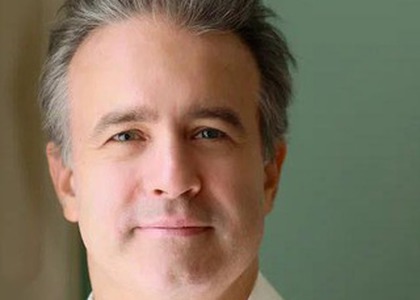> Interviews

Interview with pianist Alexei Volodin
Friday, May 9th, 2025 - The Radio Musical Season continues with a concert by the National Radio Orchestra, conducted by Sascha Götzel and featuring pianist Alexei Volodin as soloist. Ahead of his return to the Radio Hall stage, Russian pianist Alexei Volodin sat down for a conversation with our colleague, Ioana Țintea.
Mr. Alexei Volodin, you'll be performing Beethoven's Piano Concerto No. 4 in G major. How would you describe this concerto compared to his other piano concertos?
It's the freest and most romantic of them all-truly one of a kind in terms of structure. It'sactually the first time Beethoven lets the piano begin instead of the orchestra, and everything that follows keeps that original spirit-elevated, profoundly romantic, and even sublime. Then, when we reach the second movement, it becomes even more forward-thinking. Instead of a typical, drawn-out Beethoven adagio, he creates a whole new world-his own world-where the piano and orchestra interact in unexpected ways, almost like two parallel universes. There's even a brief tragic moment, but it doesn't last long, and the piece as a whole really stands apart from his other concertos because of its form.
Are there particular moments in this Concerto No. 4 that you think might catch the audience off guard?
Absolutely! Beethoven had an incredible gift for surprising his audience. Right from the first chords, you sense that something unusual, something new and unexpected is about to unfold. It's always full of surprises.
More broadly speaking, where does Beethoven's music fit into your repertoire?
For me, he's been the most important composer of all. When I was younger, his music was my main source of inspiration. Honestly, it's a big part of why I chose to become a musician in the first place-his works had such a profound impact on me. I was always looking to play a new Beethoven sonata or concerto, always diving deeper into his music. And now, with the big celebration of his work coming up in 2027, I'm actually thinking about learning something new of his again.
Your repertoire spans a wide range-from Beethoven and Brahms to Shchedrin and Medtner. Would you say that you're an interpreter who doesn't set boundaries when it comes to repertoire? How would you define yourself in this respect?
I'm interested in any kind of music, as long as it moves me or has something beautiful in it. I don't restrict myself to one particular style. I can play contemporary music or classical-it just has to be something I enjoy. For me, it'svery simple: if I love the music I'm playing, then it's right for me. That's something I was taught early on, and it's something I truly believe. Of course, some artists are naturally more convincing in certain repertoires than in others, but for me it has always been important to be able to explore different styles. I still try to stay true to that principle today.
How would you describe your artistic relationship with conductor Sascha Götzel, with whom you've worked in the past?
I remember performing Beethoven concertos with him, as well as piano concertos by Prokofiev and and concerto by Grieg. Every time, I felt he brought a very honest and musical approach. He's always a reliable partner and a truly remarkable musician.
How does it feel to return to the stage of the Radio Hall alongside the National Radio Orchestra?
It's a real joy for me. The first time you come somewhere, you don't know the people, and you always hope to be invited back. But when you do return, it feels like coming home. You want to make more music with them and play again for the same audience. I believe it'svery important for an artist to feel that a relationship is growing-not just to have a one-time experience that fades away.
The May 9th concert is dedicated to Europe Day and takes place under the title "Royal Concert." What does the idea of "royalty" in music mean to you?
For me, it may not matter all that much. Of course, kings, counts, and the aristocracy were an important support system for many of the great composers of the past-they sponsored them, backed their work, and that's how a lot of musical masterpieces came to be. But beyond that, to be honest, it's not something I think about too much. I believe people are people-some are good, others less so. Maybe the style of those times makes you think of a certain grandeur, a kind of special elegance that you can still feel in the music. But of course, music goes much deeper than that-it's about people. It's more subtle, more human. Still, every now and then, it can take your mind back to that era.
Translated by Ioana Nicolescu,
University of Bucharest, Faculty of Foreign Languages and Literatures, MTTLC, year I
Corrected by Silvia Petrescu














